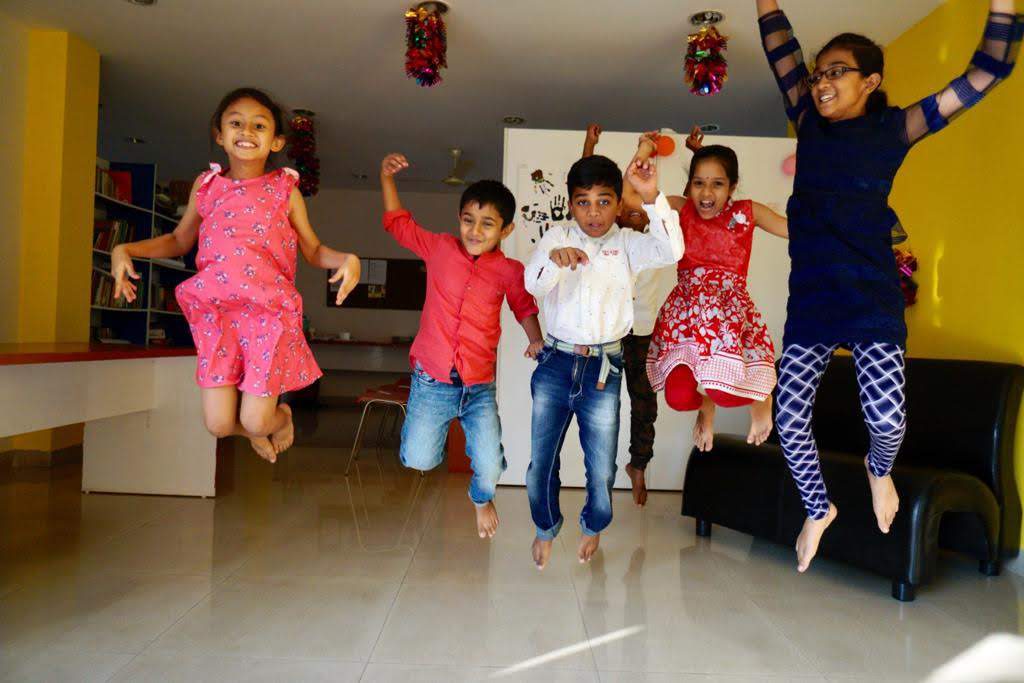“We cannot know the consequences of suppressing a child’s spontaneity when he is just beginning to be active. We may even suffocate life itself. That humanity which is revealed in all its intellectual splendor during the sweet and tender age of childhood should be respected with a kind of religious veneration. It is like the sun which appears at dawn or a flower just beginning to bloom. Education cannot be effective unless it helps a child to open up himself to life.”
― Dr. Maria Montessori
Teaching is a profession that teaches you about yourself and your limitations more than anything else. The teaching profession has taught me one thing – I am not a teacher; I am a learner. As grown-ups, we live under the illusion that we teach children. On the contrary, they teach us, if we have the willingness and openness to learn from them.
I list below, some important lessons we can learn from children. I wrote an article a few years earlier on the same topic.
Curiosity:
Children are natural wellsprings of curiosity. Their insatiable curiosity fuels their learning. Their incessant curiosity is the most important component of their cognitive development. As they grow up, their curiosity is unceremoniously suppressed by adults around them. It serves us well as teachers and parents to encourage and nurture children’s curiosity and keep our own curiosity alive.
“Respect all the reasonable forms of activity in which the child engages and try to understand them.”
– Dr. Maria Montessori
Observation:
Have you ever been embarrassed by your child blurting out an uncomfortable private conversation in front of complete strangers? It is quite a common occurrence. Children keenly observe everything around them, whether they are conscious of it or not at the time. Observation is a pathway to their learning; it is also a subconscious act of assimilating the world around them. We all could learn this critical skill of observation, especially in a world that increasingly demands our attention all the time.
“The things he sees are not just remembered; they form a part of his soul.” – Dr. Maria Montessori
Pure Joy:
The most profound quality of children is to be gleeful for no reason. They can laugh, smile and fill their heart with joy with no external trigger at all. In a world that keeps stress levels high, it is a breath of fresh air to be joyful for no reason.

Perseverance:
If a child sets her mind at something, she can keep at it for hours. Ever seen a toddler who is determined to pluck the paint off a wall? Despite distractions, hurdles and discouragement from her environment, she will come back to it every time. Perseverance is something we have come to lack as grown-ups. We go behind instant gratification and are quick to give up. This is a valuable lesson to learn from a child.
“It does not matter how slowly you go as long as you do not stop.” – Confucius
Resourcefulness:
I can remember each one of my nieces and nephews wreak havoc in the kitchen playing with utensils. This is despite an abundance of toys at their disposal. We think that children need toys to play. In reality, children need only their brains and freedom to play. They will find anything – a toy car or a twig or a piece of paper – to amuse themselves in play. It is a mental block we develop as we grow that we need specific material objects to exercise our brains. Our brains can work with or without tools. We don’t exercise our brains enough to find new ways to do things when tools are taken away from us.
Imagination:
This is by far the most fascinating quality of children. Their imagination knows no limits. All they need is a slight trigger. That can set them off into a great imaginary world of their own. When I read a story book to my niece, she is eager to finish the book. That is when the fun starts – her own interpretation and extension to the story. It is indeed a delight to hear her versions of the stories we read. When imagination is a place we frequently visit, our brains stay fresh and lively. It is an excellent way to rejuvenate the brain, also to find solutions to the most complex problems.
“Imagination is more important than knowledge.” – Albert Einstein
Conclusion:
I believe that children can teach us a lot more than we assume we can teach them. We need to immerse ourselves into the experience of being with them and absorb all that we can.
I leave you to ponder on one of my favourite verses about children.
Your children are not your children.
They are the sons and daughters of Life’s longing for itself.
They come through you but not from you,
And though they are with you, yet they belong not to you.
You may give them your love but not your thoughts.
For they have their own thoughts.
You may house their bodies but not their souls,
For their souls dwell in the house of tomorrow, which you cannot visit, not even in your dreams.
You may strive to be like them but seek not to make them like you.
For life goes not backward nor tarries with yesterday.
You are the bows from which your children as living arrows are sent forth.
The archer sees the mark upon the path of the infinite, and He bends you with His might that His arrows may go swift and far.
Let your bending in the archer’s hand be for gladness;
For even as he loves the arrow that flies, so He loves also the bow that is stable.
– Khalil Gibran
In the learning journey at NumberNagar®, our 5C™ methodology ensures that facilitators learn as much or more from the children they teach.
Dr. Soumya Sreehari
Latest posts by Dr. Soumya Sreehari (see all)
- To drink water or not to drink – that is the question - 11 June 2021
- Puzzles for fun and learning - 28 May 2021
- A questioning mind is a thinking mind - 14 May 2021
- Play and learn having fun with words - 7 May 2021
- 4 lessons to learn from the Montessori method - 30 April 2021


Awesome Chorus, looking forward to more like this
Thanks, Saadiq. Stay tuned for more!
Very thoughtfully penned.. wish all of us could remain as kids always to experience what we cannot even imagine now…And loved the conclusion, winding up with Khalil Gibran. So apt!
Thank you, Sudha! So glad you could relate to it. Khalil Gibran’s verse on children is my favourite!
Very thoughtful article , as you have said , “ it’s we who learn from the kids around us . And we have to cautiously foster them for a better future “
Thanks, Raghu. You are absolutely right! So glad it resonated with you.
Very beautiful article ma’am we all are blessed with all these qualities but somewhere while growing up our focus goes on targets, timelines, competition and we tend to leave aside these quality! However in today’s work space all of these qualities are in need and require ‘training’ which once was in us naturally. As you have rightly mentioned adult around curb the kids from expressing these qualities!
P.S – This article motivated me to ponder more on this topic for one of my future articles!
Thanks a lot, Mridula! Am so glad you got your motivation for a future article. Would love to read it.
Wonderful article. Experiencing each and every word written in the article.
Thank you so much, Vasundara. So glad to hear about your experience.